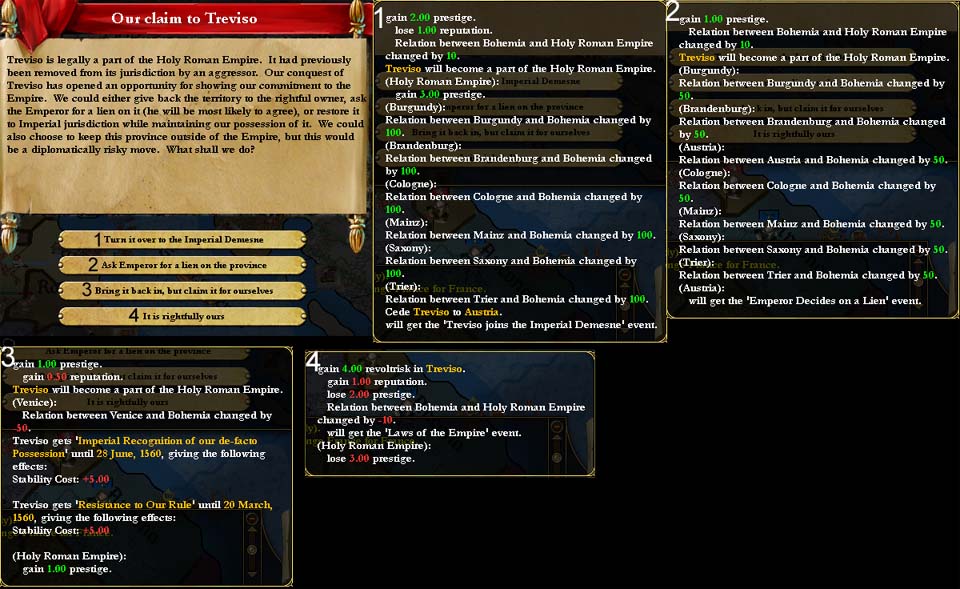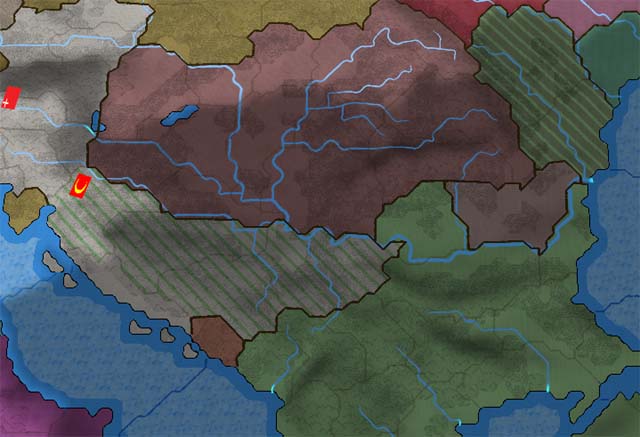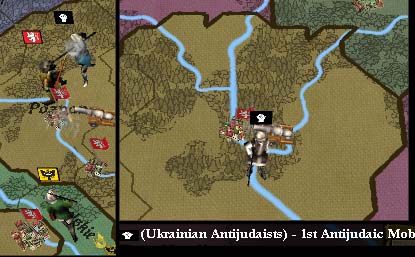14. Aspiring Peace
A pretty relaxed update for a change, also a bit shorter and more gameplay (mechanics) focused. There were few new stories to tell, but some loose ends to tie up.
In September, the first event of type 'Merchants Restless in Province' arrives, proof that we have reached trade and production tech 10.

These events will happen for provinces which, like all of their neighbouring provinces owned by me, don't have a certain level of mercantile infrastructure once the next level has been researched. In this case I have the tech to build 'Seasonal Markets', so the event prompts me to build the less extensive 'Biannual Fairs'. As you can see, the cost to do that in Torun would be 100 ducats, which is twice the regular price. The other two options have non-trivial negative consequences, making the choice difficult; I opt for the one which doesn't cost any money, because I don't have much remaining in the treasury. The event has a mean time to happen of 50 years for every province and is one of the most important reasons to invest in infrastructure in the early game. (I still won't do that soon, because it requires hiring certain advisors and I don't want to lose my current advisors)
In absence of a pope, the Council of Pisa manages to reach a relevant decision, unrelated to the situation in Rome.
A step in the right direction.
October sees the election of a new pope, Innocentius XI. He does have some ties to his Burgundian patrons (Burgundy chooses 'The pope is know to us'), but owes his election mainly to the fact that he is the candidate preferred by most of the Italian cardinals seeking to prevent conciliation with us. Everything seems to indicate that his papacy is going to be a relatively weak one.
Also in October, another battle near Krakow brings about the predicted turn on the Carpathian front.
Rather alarming news then come from the East, where the Russo-Polish war just ended.
Lithuania got split into two disconnected territories, and we now have a common border with Russia. Fortunately, we still have a royal marriage and I intend to keep relations positive with the Russians during the next time to avoid conflict. What has also become clear is that I can't wait very long to get the rest of the provinces I (may) want from Pol-Lit.
By November, the two Slovakian provinces bordering Bohemia have been secured (using assaults), while in the South Austria has assumed control over Croatia. Now to increase the warscore some more..
1509 comes and I get to move a policy slider. The decision to further secularize the country finds the approval of the estates of Bohemia (stability +1, to +2).
With this, the Ecumenism NI will finally have an effect on administrative efficiency. Together with the effect from the Bureaucracy NI, we should soon be doing very well.
I spend some of the army tradition accumulated during all these wars on a new general, who turns out to have genius-level talents.
All our current generals. The new guy is Fridrich Vratislav z Mitrovic and the most senior member of the officer corps is Miroslav ze Striba, who has been with us as a member of the general staff since the second Polish war in the late 1470s.
You can see how having both the 'Battlefield Commissions' and 'Engineer Corps' NIs pays off: There simply are no bad generals and every general will on average be much better.
The Ottoman Sultan seeks imperial attention in March, declaring war on Genoa. Austria dutifully enters the war against her long-term rival over the Balkans to prevent the loss of strategically important Lesbos (or at least worse consequences). Emperor Rudolf is not the only monarch with an interest in containing Turkish expansion and he soon finds himself as leader of a coalition including Russia, Portugal and some smaller states in the empire. Obviously, the importance of the conflict with Hungary pales in comparison to the significance this new (old) threat and, although the siege of Vienna is still ongoing, Austria's main army, together with Rudolf himself, marches directly from its current location in Croatia towards the Ottoman border in Serbia. It is reported that he was very enthusiastic about the 'crusade' and, when one of his generals expressed concerns about the situation in Austria, answered "Let the elector handle it".
Some weeks later, Vienna falls to the army of the unexpectedly competent Károly. With only 8000 men, he accomplished what in our timeline Sultan Süleyman could not accomplish with 80000. To be fair, it took the Hungarians well over half a year and the city's capitulation was under the condition that its garrison and population would be spared, which they were. (sieges, looting and occupation in general only lead to very small decreases in population in this game, except if lasting for a long time)
Miroslav ze Striba, who was on his way to relieve the city, while coming too late to prevent its fall, manages to engage a large part of the Hungarian army in battle and the Bohemian cavalry inflicts severe casualties on the enemy. The Hungarians subsequently barricade themselves behind the city walls.
Soon after, news arrive that Bratislava has capitulated to an Austrian army, while the Bohemians have taken Eger and it can't be long until they will reach Buda. Under these circumstances Károly accepts a complaisant peace offer from the emperor, who is also under pressure; the war against the Turks isn't going very well.
A sensible decision for both belligerents. Croatia is of great value for Austria as a land bridge to their Balkan holdings. On the picture you can see that England had also sent an army.
You might be wondering about what happened to the war against Venice. The truth is that I have been thinking for a while whether to demand provinces from them or not. In the end I decided for it.
Top right: Now stability is again at +3. Bottom: Our territories (light green, striped) and dependencies (dark green) in Italy.
The two newly acquired provinces fit perfectly with our other possessions; excluding Istria and Rome, everything is connected. Now only military access through Austria (and Urbino) is necessary to move armies between Bohemia and any of the Italian holdings. It wouldn't be an exaggeration to say that in a war against Austria, we could properly maintain two fronts, although no regiments can be recruited in Italy yet because of the missing cores. What is also important: Tuscany, Modena and Mantua will have no problems to move their armies to where they are needed in case of war. (AI often finds it difficult to get or even decide to ask for military access through other countries)
Talking about the value of the two provinces: Treviso is very rich and populous (both in manpower and urban population), while Verona has mediocre economic value and manpower, but the city itself is pretty large (more than 50k urban population). Both provinces are considered coastal (which gives +10% to tax and local trade income), but don't actually have a port (because there are no big coastal cities in these provinces, I assume; Padua doesn't show up on the map) and aren't subject to piracy. This is a nice little bonus and there are only a few provinces in the world sharing this quality (e.g. those bordering the Caspian Sea).
Both provinces will count towards my 'rogue' score as a member of the empire, and since I already hold two provinces illegally (Fruili and Neumark), some sanctions will doubtlessly be imposed on me rather soon. The income reduction from these sanctions will be much higher than the economic advantages attained from the two provinces. Still, I think that the strategic value of the provinces is enough to justify the cost, as my (tax-based) economy is already very strong at this point. Of course, the sanctions will disappear as soon as the empire will have been dissolved.
During this year, several thousand Jewish refugees arrive, after previously made arrangements, in Danzig to settle in Bohemian and Polish cities and found new Shtetls across our realm. I am not sure where they all came from exactly - some might be from Mecklenburg, others from Iberia.

I must now admit that I cheated a bit. After the event happened, it was still impossible to settle Jews in the Bohemia province. I looked for a reason in the files and discovered that the province had a flag called 'pogrom_happened'. After a pogrom has happened once in a province, the province gets this flag and while it is present, no Jews can be settled there. I then searched for what ways there are to get rid of this flag and discovered that the only way is though a lengthy (silent) process which requires having the Humanist Tolerance or LEF NI or a high ADM or DIP ruler and also requires the country which undergoes the process to have the 'has_expelled_jews' flag. Right, it is impossible (as far as I can tell) to remove the 'pogrom_happened' flag if the country owning the province where the pogrom happened never expelled any Jews. This seems to be an oversight or bug in SRI (I don't know if it has been fixed in more recent versions of that mod, I am of course using the one which comes with MMP2). I reasoned that 50 years after the pogrom occurred in Prague, it would be appropriate to allow the settlement of Jews in the province again and edited my savegame, removing the province flag.
In the region of the 'Jagellonian Empire' (Bohemia, Poland, Hungary, Lithuania, Ukraine, Belarus and the Baltic coast from Prussia to Estonia), the default type of Jewish settlement is the Shtetl, which is probably also the best type regarding economic benefits as it, among other things, improves tax revenue in a the province by 40%. For this reason, the Jewish refugees are very valuable in my situation. The simple increase in population from Jewish migration (and the increase in population growth from the modifiers) can also make a difference, because having high (urban) population in provinces is so important in the later game when playing Magna Mundi.
Jews can be settled in all core provinces with at least 10k urban population. (There is an extra rule allowing to settle Jews in provinces with less population if the province has the same culture and religion as the country and one has the Humanist Tolerance NI or a ADM 8 ruler (or some other requirements), but it costs 2 stability for every settlement, which is a bit much; on a perhaps interesting side note, Hungary has received Jews in the past and enacted this decisions for two of their provinces: Pécs and Kunság)
The provinces of this type I currently own are Bohemia, Danzig and Torun:
"Upgrades" (Production is low because of wars and piracy.)
The easily-won war against Hungary is over in October. Now for some well deserved peace!
All your Slovakia are belong to us.
We now own all non-Silesian provinces in our (West Slavic) culture group.
It is time for an overview of our situation:
My reputation is "tarnished" with the BB value at 5.3 (currently reduced by 1.09 per year), while the war exhaustion is pretty high (8.67), which has a lot of inconvenient effects:
It will take over seven years for the country to completely recover from the destruction and losses caused by the wars.
After these wars, Bohemia still has a reserve force (remaining manpower) of 30k men (maximum is 46k), so we still won't appear very vulnerable. In fact, we have surpassed the emperor regarding maximum manpower (Austria has 40k).
I hoped that the administrative efficiency would improve to "Good" because of the slider move, but it only improves to "Capable" (the second-best level). The kingdom has become a bit large, but it won't be long now until the "Administrative Monarchy" will become available; switching to this more bureaucratic type of government will further improve the efficiency.
Given that our stability is again at +3 and there are no revolts at the moment, the yearly income of the crown has increased to a very healthy 253 ducats. Monthly expenses are only about 2 ducats when military maintenance is set to the minimum (and inflation-gain to zero); we still have that great banker. At the same time, our largely tax based economy only provides a monthly income of about 55 ducats (For example, I don't even bother sending merchants at this point).
In January 1510, the king of Sweden is the first person to be asked if he wants to try reclaiming Rome for the pope, but thankfully he refuses.
During autumn and winter the 'crusaders' have experienced many setbacks and now nothing seems to be able to stop the advance of the -invincible?- Turks.
The strategy to use our presence in Rome to undermine the papacy and to permanently sponsor a group of cardinals and other clergymen of our own seems to start paying off; our recent "charitable contributions" were all very well received.
Our party has the upper hand. The infamy reductions the cardinals provide is actually more important for us than who gets to sponsor the pope.
Concerning Treviso, a province which originally belongs to the HRE although it doesn't show up on the map as such (I'm not sure why; Venice held the terraferma as a fief from the emperor), we are faced with an interesting decision.

The first option is obviously nonsense. Gameplay-wise, the difference between the last two options is not great: Whether or not we officially bring the province back into the empire, the empire will always consider it as being part of itself and sanctions are imposed based on that rather than on what the HRE mapmode shows. The second option is different. When it is chosen, Austria gets an event to decide on our request for a lien. If the emperor accepts, we can keep the province for at least 50 years with his blessing (the time can be extended under certain circumstances, otherwise it is then returned to the empire). We won't be able to get a core on the province (or receive any events in the coring process) during that time, but the province gets a nice modifier lowering revolt risk. If he rejects, the province is lost for us and added to the emperor's demesne. As this option seemed attractive, I looked up my chances and discovered they are 8 to 2. I take the small risk.

By the way, I don't really want to return Treviso after the 50 years. Let's call it a time limit for the dissolution of the empire.
Verona does not offer the same choice and I get the normal infamy increase and standing hit from having conquered it, resulting in this:
Yearly income decreases to 228 ducats; the other effects aren't nice too.
In April, the pope convinces the duke of Burgundy (Papal Sponsor) to firmly aim the recovery of Rome. On a more positive note, Christianity breaths a sigh of relief when the Ottoman Sultan, seemingly uninterested in pushing his armies any further North, shows his willingness to negotiate peace at reasonable terms. Considering the extensive display of strength before, the eventual demands appear very modest, but the Turkish prestige gain should not be neglected for such considerations.
Strange Crusades. The option with missing localization is to give back Rome.
I have one remaining rather humorous bit for you. It is May and the aforementioned war between Milan and Genoa just ended.
Mecklenburg is now a merchant republic. The (small) Hanseatic cities have been placed into power and brought under their control, which was easy, the sparsely populated hinterlands. Apparently the emperor doesn't find that too strange. Well, it doesn't concern us..
--
Minor Notes
Marriages of two of Ferdinand's children (unlikely to inherit) with members of the English and French royal families were arranged.
The Mamluks won a war against Ethiopia, attaining the provinces Massawa and Tajura.
France chose the "Peaceful Integration" colonial policy for their North American trading posts and beginning colonies.
England has now also reached North America and the first colonies are being established on the Eastern coast. They are all so early. (compared to OTL)
Riga has become a popular place of pilgrimage after a local priest was canonized, increasing the wealth of the Bishopric. (Base tax improved to 7)
'Tentative Acquiescence' happened for my provinces Podlasia, Verona, Kiev.
Coring progress: To 'Minor Qualms' in Sandomierz, Poznan.
 And what else could I say as the author of a Papal aar?!
And what else could I say as the author of a Papal aar?!  )
)































